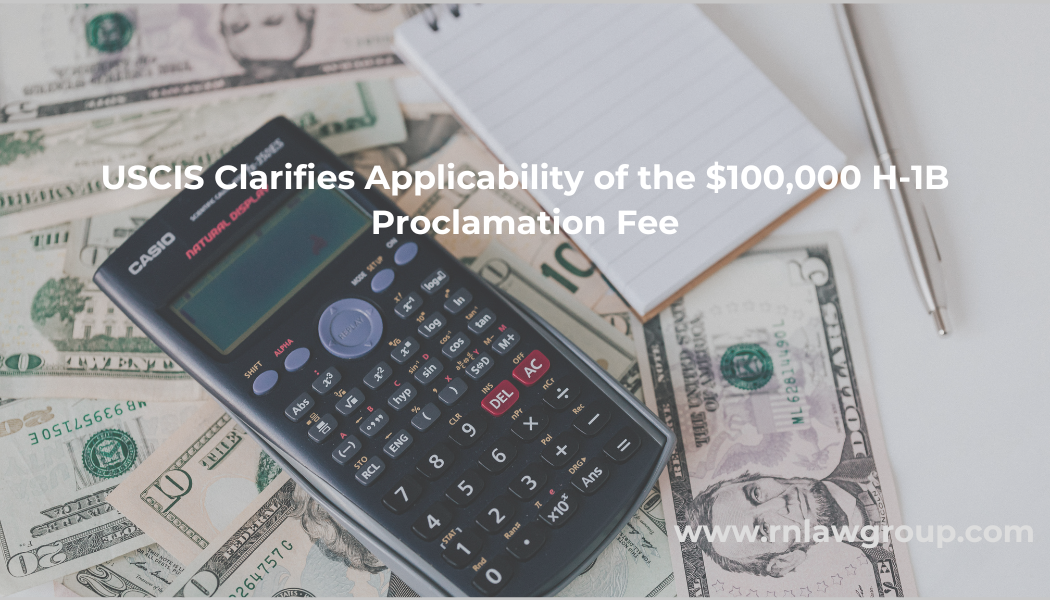
USCIS Clarifies Applicability of the $100,000 H-1B Proclamation Fee
On October 20, 2025, USCIS issued formal guidance clarifying the scope and applicability of the new $100,000 fee imposed under the Presidential Proclamation of September 19, 2025. This proclamation, titled Restriction on Entry of Certain Nonimmigrant Workers, marked a significant policy shift in the H-1B program and raised immediate concerns for employers and foreign nationals. The October 20 update now provides important detail on who is subject to the fee, who is exempt, and how payment must be made.
Who Is Subject to the $100,000 Payment
According to USCIS, the $100,000 fee applies to:
- New H-1B petitions filed on or after September 21, 2025, for beneficiaries outside the United States who do not have a valid H-1B visa.
- Petitions filed after that date that request consular notification, port of entry notification, or pre-flight inspection, even if the beneficiary is currently in the United States.
- Certain change of status, amendment, or extension petitions if USCIS determines that the beneficiary is ineligible for the requested change or extension—for example, where the person is out of status or departs the United States before the case is adjudicated.
Who Is Exempt
The Proclamation does not apply to:
- Any H-1B petition filed before September 21, 2025 – beneficiaries of H-1B petitions filed before this date can apply for visas at the consulate and travel as usual, without being subject to the fee in any form.
- Previously issued and currently valid H-1B visas – holders of these visas can travel internationally as normal, as long as they also hold a valid I-797 Approval notice from their current employer.
- Petitions filed after September 21 requesting an amendment, change of status, or extension of stay for a beneficiary already inside the United States at the time the I-129 petition is filed, provided USCIS grants the request. Importantly, once such a petition is approved, the beneficiary will not become subject to the $100,000 fee merely because they later depart the U.S. and apply for a visa at the consulate, or re-enter the U.S. using that approved petition or a still-valid H-1B visa stamp.
How and When Payment Must Be Made
USCIS requires that the $100,000 fee be paid prior to filing the petition. Employers must submit proof of payment from pay.gov with the petition filing. Petitions that fall under the Proclamation but are submitted without payment confirmation—or without proof of a granted exception—will be denied.
Exception Requests
The Proclamation allows for extremely limited exceptions, granted directly by the Secretary of Homeland Security. To qualify, the employer must demonstrate all of the following:
- The worker’s presence in the U.S. is in the national interest;
- No American worker is available to fill the role;
- The worker does not pose a security or welfare risk; and
- Requiring payment would significantly undermine U.S. interests.
Exception requests may be submitted with evidence to H1BExceptions@hq.dhs.gov. USCIS has emphasized that exceptions will be “extraordinarily rare.”
Key Takeaways for Employers and Employees
The USCIS update clarifies some of the uncertainty that followed the Proclamation’s release:
- In-country petitions for amendments, changes of status, or extensions are not subject to the fee, provided the request is granted.
- Beneficiaries of approved in-country petitions filed after September 21 may apply for visas at consulates and travel internationally using valid H-1B visas without incurring the $100,000 fee. However, given the increasing unpredictability of consular processing this year, we still strongly recommend limiting non-essential travel or proceeding with great caution, especially if obtaining a new visa at the consulate is required.
- As indicated by government officials, the fee proclamation is expected to primarily affect new H-1B beneficiaries applying from abroad in next fiscal year’s lottery. However, it may also influence strategies for individuals who cannot extend or change status in the U.S. due to a lapse in status, as well as for H-1B holders nearing the six-year maximum who would otherwise depend on departing the U.S. and pursuing a new consular application.
- Exception relief exists, but the standard is extremely high, and only a narrow group of cases are likely to qualify.
We anticipate further legal challenges to this policy in the coming months, as the Proclamation represents one of the most sweeping financial barriers ever imposed on employment-based immigration. For now, employers and foreign nationals should carefully assess whether a filing will trigger the $100,000 fee and plan accordingly.
For more updates and legal analysis on H-1B and other employment-based immigration issues, subscribe to the Reddy Neumann Brown blog or contact our office directly.
By: Rebecca Chen
Rebecca Chen is a Partner at Reddy & Neumann. Her representation includes advising clients throughout the non-immigrant and immigrant visa application process, from initial filing, responding to various requests for evidence, and processing at overseas consulates. Her years of experience in the immigration field have made her a knowledgeable resource for complex business immigration matters.

